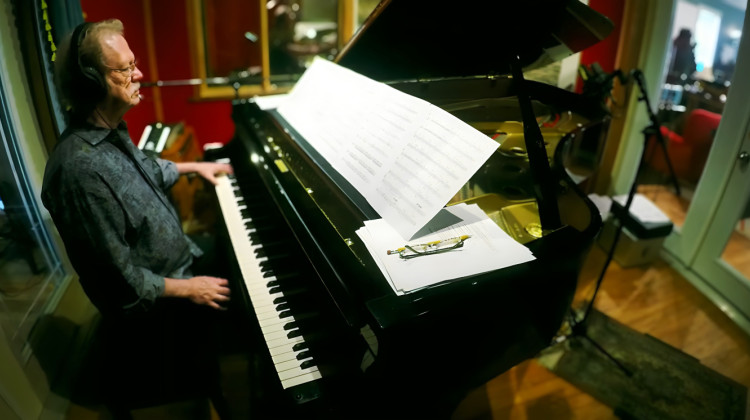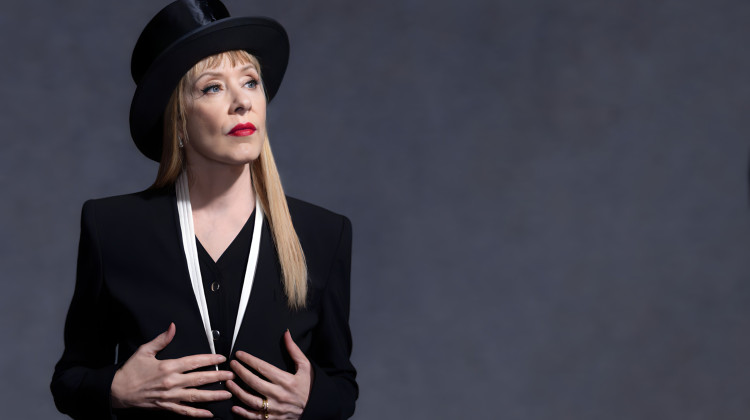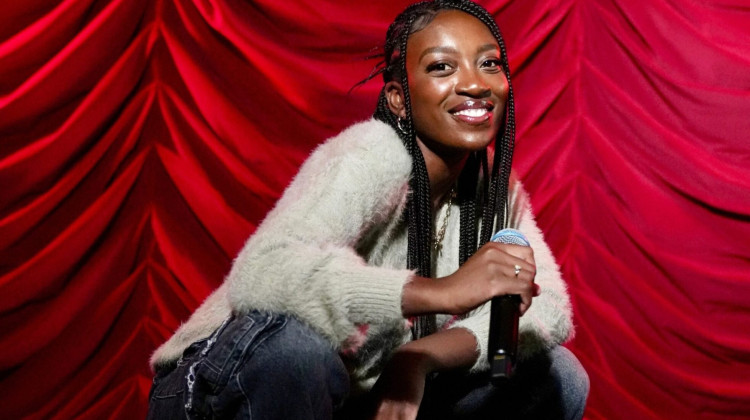Recently part of Indiana Avenue got a new name. It’s now Madam Walker Way, named for Madam CJ Walker, the legendary creator of beauty products and the namesake of the historic Walker Theatre -- now the Madam Walker Legacy Center. The center's leadership also released some big plans for the next few years leading up to its 100th anniversary. WFYI’s Ray Steele recently spoke to Kristian Little Stricklen, the president of the Madam Walker Legacy Center, about those plans.
KRISTIAN LITTLE STRICKLEN: Thank you for having me.
RAY STEELE: My very first thought when I heard that they were renaming a stretch of Indiana Avenue, Madam Walker Way was why in the world, did it take so long for that to happen?
STRICKLEN: Yes. You know, I think everything happens in its right time. And we are just excited that the time is now.
STEELE: You also announced the Madam Walker Legacy Center was creating an endowment. This is something that a lot of other arts organizations have long had. How did this come about?
STRICKLEN: So, we actually had this as a part of the Madam Walker Legacy Center's last strategic plan that technically ended in 2020. And we all know what happened in 2020. But it was as a part of that plan that the Walker needed to create a new business model. The Madam Walker had long struggled just to survive just to operate. And the Lilly Endowment in 2018 had actually given us $15 million to restore the building. But a part of that agreement was also that the Walker needed to think about what and how it was going to function moving forward. That is why the Walker actually created the partnership with Indiana University where they act as our property manager. And the other piece of that was that the Walker needed to unload these investment properties that it had been managing, which is the building that's directly next door to the Madam Walker Legacy Center, and one that is actually in the 500 block of Indiana Avenue. And so, we were able to sell the parcel and in the 500 block at the beginning of 2020. And earlier this month, we were able to sell the 700 block the 719 parcel to Indiana University Foundation. Doing so helped the Walker to first and foremost become 100% debt free. And the dollars from that is what we are able to now use to create an endowment for the Madam Walker Legacy Center. As you said, it is something that a lot of arts organizations long have had. It is not something that is typical for African American nonprofit organizations. And so, we are so excited to be in this new space. It was all part of the plan, part of that strategic plan, and it is the first one of the first priorities of our new strategic plan.
STEELE: Maybe you can talk about this, why don't or why haven't historically African American based arts organizations not been able to have that kind of funding to have an endowment? Is that just a legacy from decades of you could call it systemic racism, call it whatever you want. Is that the reason that African American organizations have that kind of issue?
STRICKLEN: I believe it is all of the above. And the Madam Walker Legacy Center is not just an arts organization, we are a full nonprofit and arts is one of the pillars that we that we do support. But in general, I do believe that it is all of those things in general, there are a lot of organizations that just struggle to survive. Some of that is systemic racism, because they put us in they put those organizations in a small bucket, and everyone's kind of fighting for the same amount of dollars instead of having opportunities to go after just the larger dollars like other nonprofits. We are a nonprofit and we have a focus just like any other organization. And we are glad that we are starting to move forward. That is all a part of our plan. We still are laser focused on the areas that we know we need to focus on. But we serve everyone and we want everyone to come in to our venue as well.
STEELE: What is the plan for the endowment once you get what you're looking to raise? What is that money going to be used for?
STRICKLEN: So primarily it is to ensure that the Walker is going to be self-sustainable, you know, moving forward, our board will meet in the next few weeks to talk about it in more detail. We needed to get to this point first. And so now that we're here, we'll talk about what and how long term we want to do that outside of being self-sustainable. But the first priority is that the Madam Walker needed to be financially sustainable.
STEELE: One of the other things that stood out in the strategic plan was the idea to turn the roof of the Walker into an outdoor rooftop event space. How big of an event space are we talking about here? And what does that look like, or what do you envision that looking like?
STRICKLEN: So, it is another is another venue, another venue space. So, the Madam Walker is like two organizations in one. We are a nonprofit, but we are also a venue. We have a just under 900 seat venue, we have a ballroom. And we have other spaces that are available for lease inside the building that have nothing specifically to do with what and how, as a nonprofit that we work, but it is all still under Madam Walker. And so that is a space that was again, it was a part of the original restoration plan. But because the building was just in such disarray, it was put on hold. And so it was one of the things that we really, once we got back inside the building and got up and running, that we said we really want to work on this and so Nina Mason Pulliam Charitable Trust gave us $250,000 of seed dollars to be able to start looking at that roof, that would be something that would be another community space. But it would also be used as a space that the community could also rent out. You know, I think on the other side of COVID, we're seeing that those spaces, those indoor/outdoor spaces are becoming more and more popular. There are some other popular venues here in town that have also recently announced that they are either looking at a rooftop space and/or some type of indoor/outdoor space. And I do believe that while the Walker is intimate, that we have to stay competitive, to be able to survive. And so, to do that, we've got to be able to stay on top of it. And I'm just really excited about that being a part of our future, hopefully in 2024.
STEELE: A brief disclosure. The Nina Mason Pulliam Charitable Trust is also a financial supporter of WFYI. I'm glad you mentioned something earlier, and I want to come back to it, because I think a lot of people only think of the Walker as the theater, as the venue. The Madam Walker Legacy Center nonprofit does what else in addition to that?
STRICKLEN: Yes, thank you for that question. Because I think you're right. I think just historically, everyone remembers the theater, or their grandparents having a great time in the ballroom. But the Madam Walker Legacy Center as a nonprofit actually exists to uplift the legacy of Madam Walker, which is why I said we're not just an or an arts organization. Madam Walker was not an artist. Madam Walker enjoyed the arts. Madam Walker was an entrepreneur, she was a philanthropist. She was a fighter for social justice. And those are the other three pillars, entrepreneurship, social justice, equity, specifically women's equity, that we thrive to do programming around in addition to arts and entertainment. And so that is one of the other pieces of our new plan is to really elevate the nonprofit and to be able to make a local impact but also a national impact because she is a national figure. And we are just so grateful that she stopped through Indianapolis many, many years ago, and has such an impact and left us such a jewel, which is the Madam Walker Legacy Center. And so, it's our goal to really and truly educate everyone on who she was beyond just haircare and what impact she actually had on this community.
STEELE: And now I guess it's time to go raise that money.
STRICKLEN: Yes, it is.
Kristian Little Stricklen is president of the Madam Walker Legacy Center. There's more information on their strategic plan at https://madamwalkerlegacycenter.com.
 DONATE
DONATE







 Support WFYI. We can't do it without you.
Support WFYI. We can't do it without you.